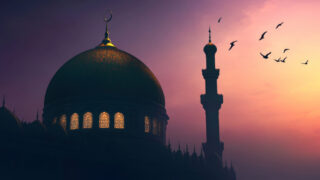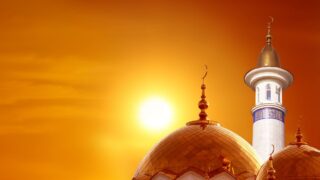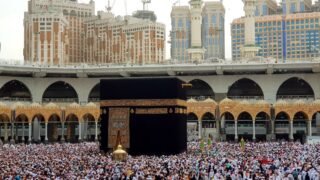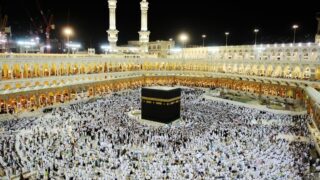Whenever I think about Islam’s stance on freedom, I am shocked by the words of some Muslim thinkers who see freedom as a Western and liberal deviation that has no basis in Islam and does not agree with the spirit of religion. They wave in your face the verse “And I did not create the jinn and mankind except to worship Me” (Adh-Dhariyat 51:56) to emphasize the worship of the creation to God and that they have no freedom.
But I always wonder: is it reasonable the Creator humiliate, may He be exalted, and to degrade the creature whom He created and breathed life into him, and preferred him over all His creatures? Is it reasonable that God, may He be exalted, deprives man of his freedom and will? Which is more Islamic, for a person to believe in God out of conviction and satisfaction, or to be forced to do so like the heavens and the earth? Indeed, carrying the trust that God has entrusted to man in his saying “Indeed, We offered the Trust to the heavens and the earth and the mountains, and they declined to bear it and feared it; but man [undertook to] bear it. Indeed, he was unjust and ignorant.” (Al-Ahzab: 72)
This trust requires strength, will, freedom, and choice. How could God, may He be exalted, burden man with all this responsibility without giving him the freedom and will to carry it out?
This is what Allah, the Merciful, has done. Reflect on the verses of honor: ‘And We have certainly honored the children of Adam and carried them on the land and sea and provided for them of the good things and preferred them over much of what We have created, with [definite] preference‘ (Surah Al-Israa, 70). When you contemplate these verses, you find that the highest station of this honor is the intellect, which Allah has not honored in any other creature besides humans. The intellect is the place of freedom in its highest degrees, through which a person contemplates and reflects on the kingdom of the heavens and the earth and their creation, as well as in themselves, as Allah says: ‘And in yourselves; then will you not see?’ (Surah Adh-Dhariyat: 21). This leads the person to know their Creator, submitting to Him willingly, satisfied and believing with full will and freedom, not humiliated or compelled, unlike the heavens, the earth, and all other creatures.
I have stood for a long time pondering over these verses, and the greatness and mercy of Allah have become clear to me through His blessings upon humans with freedom, intellect, and will. To confirm that the intellect is the greatest blessing of Allah upon humans, Allah has provided the human intellect with the abilities to think and understand, as He says: ‘And Allah has extracted you from the wombs of your mothers not knowing a thing, and He made for you hearing and vision and hearts that perhaps you would be grateful’ (Surah An-Nahl: 78). Hearing, vision, and heart are the components of awareness and the pillars of the intellect. Allah, the Exalted, has blessed humans with these components to launch into this vast universe, contemplating what surrounds them like a free bird building and developing to establish the caliphate of Allah on earth.
Man will not truly build unless he is free, aware, and knowledgeable of what he is doing, not blindly following. Therefore, Allah warns him: ‘And do not pursue that of which you have no knowledge. Indeed, the hearing, the sight and the heart – about all those [one] will be questioned’ (Surah Al-Israa, 36). Allah warns humans not to be followers without knowledge because they will be held accountable for it. Man must use his hearing, vision, and heart to reach the truth with knowledge, not to be a follower, submissive and humiliated, following others
So that human beings may be knowledgeable and not blind followers, God has bestowed upon them another blessing, which is knowledge. Through this blessing, humans are distinguished, honored, and elevated above all other creatures, even the angels who worship God day and night without rest. Knowledge is a great blessing through which God challenged His angels to prove the superiority of humans over all other creatures. “And He taught Adam all the names, then showed them to the angels, saying, ‘Tell Me the names of these, if you are truthful.’ They said, ‘Glory be to You! We have no knowledge except what You have taught us. Indeed, it is You who is the Knowing, the Wise.’ He said, ‘O Adam, inform them of their names.’ And when he had informed them of their names, He said, ‘Did I not tell you that I know the unseen in the heavens and the earth and that I know what you reveal and what you conceal?’“(Surat Al-Baqarah: 31)
When Allah, the Almighty, wanted to send down His beloved creation to earth to inhabit it, He equipped them with knowledge, intellect, and the faculties of hearing, sight, and understanding, granting them the freedom to use these blessings, either gratefully or ungratefully, as stated in Surat Al-Insan,(3): “Whether grateful or ungrateful.” Allah will question them on the Day of Judgment. Allah would not question and judge them if He had not granted them complete freedom to use His blessings, even if they exceeded the limits and became arrogant, because everything has an appointed time, as stated in Surat Taha, verse (129: “Had it not been for a word from your Lord [postponing it], it would have been an obligation [that was due] and a specified term [decreed].“) Moreover, even the reckoning on the Day of Judgment will not be by coercion or compulsion but rather by evidence and proof, as stated in Surat Al-Isra verse(13) : “And every man’s fate We have fastened to his neck; and on the Day of Judgment, We shall bring out for him a scroll, which he will see spread open.” This is the pinnacle of freedom.
The freedom that God has granted humans is manifested in its purest form in the Creator’s attitude towards Satan’s disobedience when he refused to prostrate to Adam, the honored creature bestowed with the greatest blessings. Satan’s arrogance did not lead to his destruction, even though God had the power to do so. Instead, God challenged him by exposing his inability to deceive His righteous servants who were honored with knowledge, reason, and free will. If they use these blessings correctly, Satan will not find a way to them.
Therefore, the struggle between humans and Satan on earth is a struggle between truth and falsehood, justice and injustice, freedom and oppression, knowledge and ignorance.
The freedom that Allah has granted to humans was manifested in the use of the intellect of our prophet Ibrahim (peace be upon him) to reach the truth of his Creator. Allah says, “And thus did We show Ibrahim the kingdom of the heavens and the earth that he might be of those who are certain. So when the night overtook him, he saw a star. He said, ‘This is my Lord.’ But when it set, he said, ‘I do not love those that set.’ And when he saw the moon rising, he said, ‘This is my Lord.’ But when it set, he said, ‘Unless my Lord guides me, I will surely be among the people gone astray.’ And when he saw the sun rising, he said, ‘This is my Lord; this is greater.’ But when it set, he said, ‘O my people, indeed I am free from what you associate with Allah. Indeed, I have turned my face toward He who created the heavens and the earth, inclining toward truth, and I am not of those who associate others with Allah.’” (Al-An’am: 75-79)
Ibrahim did not suffice with these clear verses to indicate his Lord, but he sought a stronger proof. He asked Allah to show him how He resurrects the dead, and Allah answered him with the utmost freedom, without telling him that he is a created being who must believe and be content with that. Allah says, “And when Abraham said, ‘My Lord, show me how You give life to the dead.’ Allah said, ‘Have you not believed?’ He said, ‘Yes, but [I ask] only that my heart will be satisfied.’ “(Al-Baqarah: 260)
The request of Ibrahim was a call to use the intellect so that one can stand with what one has knowledge of and not with what one has no knowledge of, and so that the hearing, sight, and heart may be witnesses to that. The dialogue between Allah and Iblis, the dialogue between Ibrahim and his Lord, and even the dialogue between Musa (peace be upon him) and Allah’s speech to him are the most accurate expressions of the freedom that Allah has granted to His creation in its noblest and most exalted forms.
If Allah did not oppress humans but granted them complete freedom, then why do some humans seek to deprive others of their freedom?
From here, humans are required to strive for their freedom, which God has honored them with, and to defend it no matter the cost, as victory for freedom is victory for religion and an achievement of God’s justice, which He has honored His creation with when He endowed them with intellect and knowledge. Therefore, any call for subjugating humans, no matter what its motivation is, is a call to change God’s intended purpose for humans. Peace and stability can only be achieved by preserving this freedom and protecting it with all our might.
Let the rulers, the tyrants, and the scholars of the rulers, who call upon people to submit, even if they are subjected to injustice, know that God has prohibited coercion in religion, so how about coercion in governance? God says, “There is no compulsion in religion. The right direction is henceforth distinct from error” (Surat Al-Baqarah: 256). He even warns His Prophet not to force people to worship Him, saying, “Would you compel people to become believers?” (Surat Yonus: 99). Some people argue that the Prophet did not draw his sword or command to fight those who refused to accept Islam, but he fought those who stood in the way of God’s call with their wealth and themselves, or those who betrayed their pledge among the Jews and the pagans.
Therefore, if God Almighty warns against coercing people into entering religion, it is best not to coerce people into a ruler or a rule they do not want. The best solution is to care for people and their governance by establishing justice, achieving equality, upholding the truth, fighting corruption, and preventing it. Otherwise, it will lead to corruption on earth, and its punishment will be hell and a miserable abode. God says, “And among the people is he whose speech about the worldly life impresses you, and he calls Allah to witness as to what is in his heart, yet he is the fiercest of opponents. And when he goes away, he strives throughout the land to cause corruption therein and destroy crops and animals. And Allah does not like corruption. And when it is said to him, ‘Fear Allah,’ pride in the sin takes hold of him. Sufficient for him is Hellfire, and how wretched is the resting place” (Surat Al-baqarah: 204-206). Who is capable of destroying crops and animals other than rulers and authorities?
Managing people’s affairs can only be done with acceptance and satisfaction. If these are absent, then it is coercion which Allah warned against. Therefore, it is not permissible for a Muslim to take charge of people’s affairs without their consent. It is up to the people, or their wise ones, to choose the means that achieve governance with satisfaction and acceptance, whether it is a Caliphate, parliamentary democracy, Shura or any other means agreed upon that ensures every wise person gives their opinion without oppression or guardianship. Modern means of communication are, in my opinion, a blessing from Allah to frame this freedom and facilitate people’s choice of who should voluntarily and freely take charge of their affairs.
What we have mentioned above is not a call for Muslim peoples to revolt against their rulers and authorities, but an attempt to root the concept of freedom in Islam, even if the term ‘freedom’ is not explicitly mentioned in the Quran or Hadith. Freedom, as we understand it, is the exercise of reason, the will that Allah has bestowed upon His creation to decide which path to take, whether it is the path of guidance or misguidance. Freedom in the realm of human beings, as explained by Professor Muhammad Abu al-Qasim Hajj Hamad, is like a bird soaring in the sky, held only by Allah. The bird flies freely by Allah’s power, and likewise, man in this worldly life is free, unrestricted except by the fear of Allah and His guidance.
Our call is a call to root the concept of freedom in front of those who want to deprive the Muslim of their God-given freedom, claiming that freedom as practiced by the West is nothing but corruption, depravity, and pure licentiousness. But does the deviation of Western man from true freedom mean that others are deprived of it? Some claim that Muslims are not competent enough to apply freedom because most of them are uneducated and do not know the meaning of freedom. Educating people is a religious duty on the rulers and people of authority to ensure that ignorance does not remain among Muslims. The ignorance of people is not an excuse to deprive them of their most important rights bestowed upon them by Allah. Teaching people how to exercise and implement freedom in all aspects of their lives is essential for creating an ideal, stable society, and achieving the peaceful society that Allah has promised.
Our call is not a call for revolution, but a call to demand a legitimate right that honors and dignifies Muslims in this world, just as Allah honored them on the day of their creation. It should be known that demanding freedom is not a rebellion against obedience, because there is no obedience to a creation in disobedience to the Creator. According to the teachings of religion, everything that belongs to a Muslim is sacred: their blood, property, and honor. Therefore, if a Muslim rebels demanding their freedom, it is not a rebellion against religion, but a demand for their right, which religion has guaranteed for a dignified life. “There is no dignity without freedom.” Allah also commands Muslims to defend themselves if they are oppressed, as He say, “And those who respond to their Lord, establish prayer, and their affairs are conducted by mutual consultation, and from what We have provided them, they spend. And those who, when tyranny strikes them, they defend themselves.” (Surat Ash-Shura: 38-42). Tyranny is nothing but injustice in all its forms. Allah promises punishment for those who commit injustice and oppress people, and not for those who demand their rights. The scholars have explained that these verses refer to the individual rights of Muslims, and they have overlooked the fact that rights are general, and that the individual is a symbol of the community. It is not without reason that Allah speaks of injustice immediately after the command to establish mutual consultation. Mutual consultation (a form of democracy) is a general command, not specific to an individual, and thus injustice is also general, and its effects may extend beyond the individual to their small family and the larger community. Moreover, someone who oppresses one individual may not hesitate to oppress an entire community.
Perhaps the silence of the Quran and the Prophet Muhammad, peace be upon him, about the method of governance that Muslims should follow after him is the greatest evidence that Allah and His Prophet wanted Muslims to use their intellects and find the best way to govern themselves freely, as long as this way does not violate the principles of religion, as stated in the Quran.
Freedom is a pure Islamic and religious value, and Muslims are the first people to have it because they appreciate its consequences, understand its limits, and understand its purpose. Therefore, depriving them of practicing it is obstructing one of the blessings of God that He has bestowed upon His creation. Therefore, Islam preceded the West in affirming freedom. Their prophet practiced it in the Constitution of Medina, in his speech at Mount Arafat, in consultation and the management of Muslim affairs, and it was practiced by the Rashidun Caliphs after him. When the Umayyads and Abbasids hindered it, the Muslim society began to deteriorate and lag behind in civilization. Those who deny Muslims their right to freedom are in the same position as the angels when God decided to create Adam: “And [mention, O Muhammad], when your Lord said to the angels, “Indeed, I will make upon the earth a successive authority.” They said, “Will You place upon it one that causes corruption therein and sheds blood, while we declare Your praise and sanctify You?” Allah said, “Indeed, I know that which you do not know” (Al-Baqarah 2:30).
Therefore, if the creation before Adam was corrupt and bloodthirsty, it is not an argument against God. If the corruption and deviation of the people of the West from true freedom, it is not an argument for depriving Muslims of their God-given right.”
Translated by: Mahmoud Nour


















